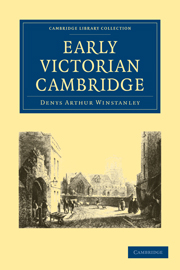Book contents
- Frontmatter
- Contents
- Preface
- Chapter I THE FOUNDATION OF DOWNING COLLEGE
- Chapter II A COLLEGE ELECTION
- Chapter III UNDERGRADUATES IN BONDS
- Chapter IV THE ATTACK ON HEADS OF HOUSES
- Chapter V CHRISTOPHER WORDSWORTH
- Chapter VI THE RELIGIOUS TESTS
- Chapter VII CHANCELLORS AND HIGH STEWARDS
- Chapter VIII TOWN AND GOWN
- Chapter IX TROUBLE AT THE FITZ WILLIAM
- Chapter X INTERNAL REFORM
- Chapter XI THE ROYAL COMMISSION
- Chapter XII BETWEEN THE TWO COMMISSIONS
- Chapter XIII STATUTE XLI AND THE THREE REGIUS PROFESSORSHIPS
- Chapter XIV THE STATUTORY COMMISSION AND THE UNIVERSITY
- Chapter XV THE STATUTORY COMMISSIONERS AND TRINITY COLLEGE
- Chapter XVI CAMBRIDGE AS IT WAS
- Appendices
- Index
Chapter XIV - THE STATUTORY COMMISSION AND THE UNIVERSITY
Published online by Cambridge University Press: 07 September 2010
- Frontmatter
- Contents
- Preface
- Chapter I THE FOUNDATION OF DOWNING COLLEGE
- Chapter II A COLLEGE ELECTION
- Chapter III UNDERGRADUATES IN BONDS
- Chapter IV THE ATTACK ON HEADS OF HOUSES
- Chapter V CHRISTOPHER WORDSWORTH
- Chapter VI THE RELIGIOUS TESTS
- Chapter VII CHANCELLORS AND HIGH STEWARDS
- Chapter VIII TOWN AND GOWN
- Chapter IX TROUBLE AT THE FITZ WILLIAM
- Chapter X INTERNAL REFORM
- Chapter XI THE ROYAL COMMISSION
- Chapter XII BETWEEN THE TWO COMMISSIONS
- Chapter XIII STATUTE XLI AND THE THREE REGIUS PROFESSORSHIPS
- Chapter XIV THE STATUTORY COMMISSION AND THE UNIVERSITY
- Chapter XV THE STATUTORY COMMISSIONERS AND TRINITY COLLEGE
- Chapter XVI CAMBRIDGE AS IT WAS
- Appendices
- Index
Summary
The Statutory Commissioners held their first meeting on 27 September 1856, at 6 Adelphi Terrace, where offices had been assigned them. They were provided with a secretary, Edward Bunbury, at a salary of eight hundred pounds a year, a clerk, an office-keeper and a housemaid; but for the first few months they had nothing to do except to inform the Vice-Chancellor and Heads of Houses that they were ready to receive communications from the University and the colleges, “with the view of carrying into effect the objects of the Act of Parliament”. The first moves had clearly to come from the University, but, before they could be made, the machinery of academic government created by the Act had to be set up. This was done during the Michaelmas term 1856, which saw an old order yielding place to new. On Monday, 13 October, the last Caput was elected, and those chosen to serve on it might have fittingly exclaimed morituri te salutant, for that venerable and much abused body was to pass out of existence on 6 November. On 3 November the Heads of Houses exercised for the last time their ancient statutory right of nominating two candidates for the office of Vice-Chancellor; and though they committed an irregularity by passing over the Master of Magdalene whose turn it was to serve, and nominating in his stead Dr Philpott, no offence was thereby given, as the need of a particularly competent Vice-Chancellor during this crisis in the fortunes of the University was fully realised, and the Master of Magdalene did not wish to stand for election.
- Type
- Chapter
- Information
- Early Victorian Cambridge , pp. 314 - 338Publisher: Cambridge University PressPrint publication year: 2009First published in: 1940



